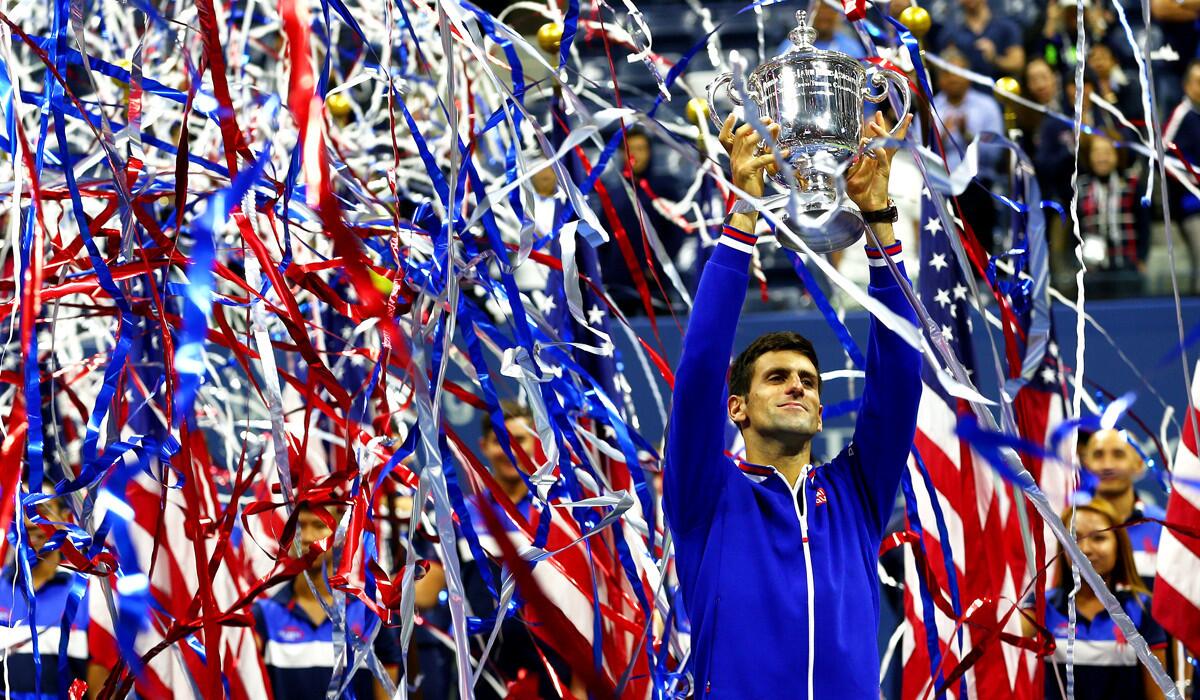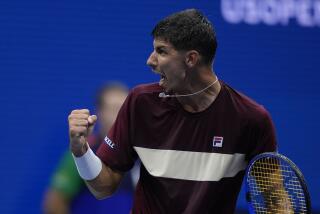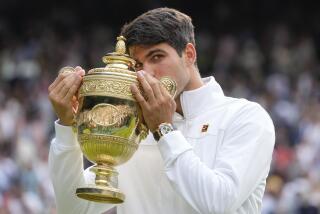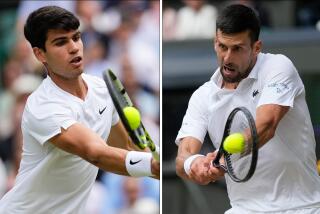Novak Djokovic, No. 1 and bulletproof, is kryptonite to Roger Federer in U.S. Open final

Novak Djokovic celebrates with the winner’s trophy after defeating Roger Federer during their Men’s Singles Final match on Sunday.
- Share via
Reporting from NEW YORK — Tennis calls Novak Djokovic the No. 1 player in the world. Roger Federer probably calls him kryptonite.
Djokovic was Superman once again here Sunday night, beating Federer for the U.S. Open men’s singles title with a stirring 6-4, 5-7, 6-4, 6-4 victory, in 3 hours 20 minutes.
It is difficult to give proper perspective to the achievements of the 28-year-old Serb. When he took the court, he was not only facing a tennis legend in Federer and his record 17 major titles, but he was taking on one of the most popular players in the history of the game.
Federer is 34 and still playing at the highest level. Fans love that.
He exudes cool — how he walks, how he dresses, how he conducts interviews, how he stays calm no matter how wild or pressure-packed the situation is on the court. Fans love that.
Djokovic was facing not only 125-mph serves, but a raucous pro-Federer crowd that had a 3-hour 20-minute beverage warmup because of a rain delay. Federer is wildly popular in 50 of the United States, as well as about 190 other countries. The jury is out on Uzbekistan.
They cheered Federer like he was Derek Jeter.
“It was a great battle, and they were right there when I needed them,” he said.
Djokovic never has objected to pro-Federer crowds. “It is logical to expect,” he said, “that a great player and great champion get that support.”
So, with his every double fault and every missed forehand being cheered wildly, Djokovic persevered. He had won this title once before, in 2011, but lost four other times in the final. This was not the friendly confines of the Australian Open, where he has won five times. This was Federer land, where the Swiss star won five straight, ’04 to ‘08, but none since.
Federer had won their last meeting, last month in Cincinnati. But the previous two meetings that mattered most, Wimbledon 2014 and Wimbledon 2015, went to Djokovic, Federer’s kryptonite.
This was billed as a matchup between the offensive skills of Federer and the defense of Djokovic. That’s an oversimplification. Federer does play great attacking tennis and, on hot streaks such as the one he was on here, can power an opponent right off the court. Before Sunday night, the last set he had lost was in that July Wimbledon final. To Djokovic.
But it quickly became apparent Sunday night that Djokovic was not Richard Gasquet or Philipp Kohlschreiber. Federer’s best offerings came back. And back. And back.
It wasn’t old-time backboard defense. Djokovic attacks while he defends. Defensive specialists seldom average 115 mph on first serves. Djokovic did, exactly matching Federer.
SIGN UP for the free Dodgers Dugout newsletter >>
Djokovic did defend well when it counted most. The key to the match was one statistic: Federer had 23 break points and failed on 19 of them. Only once, on a forehand down the line to break Djokovic at 5-6 of the second set, did Federer convert in a crucial spot. And even in that game, he flubbed three previous chances.
“I had so many break chances,” Federer said afterward. “. . . I should have done better.”
Lost in the buildup to Serena Williams’ quest for a Grand Slam — she fell short in the semifinals — was the possibility that, in the frame of reference of major titles, Djokovic could have a better year than she did. When he won, he did.
He took titles at the Australian, Wimbledon and U.S. Open and lost a round later in the French (the final, to Stan Wawrinka) than Williams did in the U.S. Open. The 2015 title for the Almost Grand Slam goes to Djokovic.
The end of the third set capsulized the entire match against Federer.
With the crowd of 23,700 in Arthur Ashe Stadium clearly understanding the set’s pivotal nature because the players were tied at a set apiece, and unleashing their vocal cords at Federer’s every positive moment, Federer got it to 15-40 on Djokovic’s serve at 5-4. Then Djokovic hit him with a big serve and Federer hit a backhand wide. Back to deuce.
He had failed in the big moment, and when Djokovic pinned him deep on set point, Federer could only hit a forehand wide. That set point was pretty much match point.
To his credit, Federer made Djokovic serve for the match twice. Down 5-2 in the fourth set, he broke Djokovic’s serve, then got two more break points with the Serb serving at 5-4 — two chances for Federer to get back on serve and level the set. But Djokovic fought them off, which is why Djokovic is who he is. He got back to deuce, pounded a 121-mph serve to get to his first match point, and duplicated that serve on match point, watching in delight as Federer floated his return long.
They have now played 42 times. Each has won 21.
This was Djokovic’s 10th major title. Also, his first $3.3-million winner’s check, which became $3.8 million with additional winnings from the lead-up U.S. Open series.
And while Djokovic, 28, is not likely to surpass Federer’s 17 major titles, he is now tied for seventh all-time among men. He shares that spot with Bill Tilden. With his next one, he will tie no less than Bjorn Borg and Rod Laver.
“Winning three of the four Slams,” Djokovic said, “is more than I could ask for. . . . It’s been an incredible season.”
He also knows that even at 34, Federer will be across the net again, in big moments and in loud places.
“He’s not going away,” Djokovic said. “He’s always going to be out there, making you play your best. That’s who Roger is.”
Had there been any doubt of his return, Federer took care of that in the awards ceremony, with typical humor.
Playing off women’s champion Flavia Pennetta’s startling retirement announcement Saturday at the end of her speech, which she began, “One more thing . . .” Federer ended his with a twinkle in his eye.
“One last thing,” he said, pausing. “I’ll see you guys next year.”
bill.dwyre@latimes.com
Twitter: @DwyreLATimes
MORE SPORTS COVERAGE
Marcus Mariota outplays Jameis Winston, again; Seahawks flub the ending, again
USC preparing for Stanford’s straight-forward approach
A game-ending ‘crazy, freak play’ with a stuck ball hurts Angels
More to Read
Go beyond the scoreboard
Get the latest on L.A.'s teams in the daily Sports Report newsletter.
You may occasionally receive promotional content from the Los Angeles Times.











